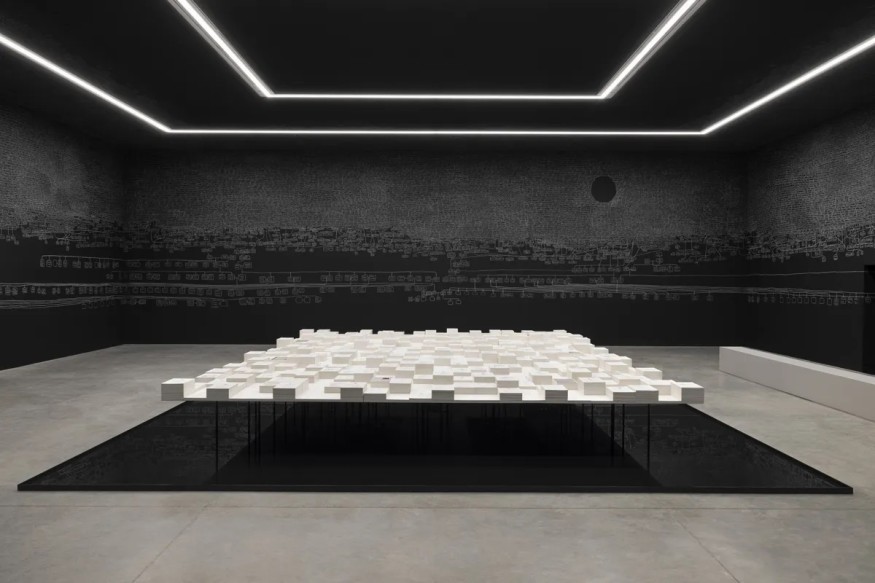Mataaho Collective and Archie Moore Win Top Honors at Venice Biennale 2024

This year's 59th edition of the Venice Biennale, the most important art event in the world, has a significant impact on the art world, with over 560,000 visitors to the city. Through majestic-sounding recognition, Mataaho Collective and Archie Moore, true Indigenous talent, were awarded in the show, reflecting the variety of communities and the artistic richness.
The Mataaho Collective, comprising four talented Māori women artists - Bridget Reweti, Erena Baker, Sarah Hudson, and Terri Te Tau - claimed the Golden Lion for the leading curated exhibition. Their masterpiece, "Takapau (2022)", a mesmerizing installation crafted from woven polyester hi-vis tie-downs, captivated viewers and served as a symbolic passageway into the heart of the Biennale's showcase.
Adriano Pedrosa, the curator of the leading exhibition, hailed the Mataaho Collective's work as a fusion of cosmology and shelter, drawing inspiration from matrilinear textile traditions. The jury, led by President Julia Bryan-Wilson, lauded the collective's strength and creativity and recognized its impressive engineering feat.
Moore's Poignant Reflections
Meanwhile, representing Australia, Archie Moore clinched the Golden Lion for the National Pavilion with his thought-provoking installations. Moore's artistic vision transformed the Australia Pavilion into a solemn reflection of history and heritage. By meticulously inscribing his family tree spanning 65,000 generations onto chalkboard black walls, Moore invited viewers to contemplate the enduring legacy of Indigenous peoples. Additionally, his poignant depiction of redacted documents floating over a reflecting pool highlighted the tragic toll of colonialism on First Nations communities.
Recognizing Emerging Talent
The Venice Biennale's commitment to showcasing emerging talent was further underscored by the awarding of the Silver Lion to Karimah Ashadu. Her work, "Machine Boys (2024)," offered a poignant exploration of economic precarity through the lens of motorcycle taxis in Lagos. Ashadu's feminist perspective and intimate portrayal of subcultural experiences resonated deeply with the jury, earning her well-deserved recognition.
Also Read : Chris Pratt Sparks Outrage by Demolishing Historic 1950 LA Home for Sprawling Mega Mansion
Special Mentions and Lifetime Achievement
The diverse jury, chaired by Julia Bryan-Wilson and comprising international curators such as Alia Swastika, Chika Okeke-Agulu, Elena Crippa, and María Inés Rodríguez, demonstrated a keen appreciation for artistic innovation and social commentary. Special mentions were accorded to artists Samia Halaby and La Chola Poblete and to the Republic of Kosovo for Doruntina Kastrati's evocative sculptural installation.
Halaby's abstract painting, "Black Is Beautiful (1969)", and Poblete's trans-Indigenous watercolors were commended for their critical engagement with colonial narratives and representations of Indigenous identity. Similarly, Kastrati's sculptures, inspired by the factory production of Turkish delights, elicited praise for their vibrant portrayal of feminist activism.
In addition, the award ceremony was about Ann Maria Maiolino and Nil Yalter, who were given the Golden Lion for Lifetime to acknowledge their endless efforts for the art world. Through the commendable work of Maiolino promoting Brazilian art and the peacemaking efforts of Yalter, the Biennale's role in the creation of a cultural exchange channel and dialog is clearly demonstrated.
Future Commitments and Concluding Remarks
Italian Culture Minister Gennaro Sangiuliano reaffirmed the future of the Biennale as he confirmed its commitment to the autonomy and the freedom of the artists. The Biennale was completed with a glimpse of hope in the development of contemporary art. The Venice Biennale's triumph in this regard was emphasized by the victory of Indigenous artists Mataaho Collective and Archie Moore, in whose efforts the Venice Biennale reaffirmed its role as a factory for the celebration of diversity, creativity, and solidarity across national lines.
In an era where the urge for belonging and solidarity drives people, the Venice Biennale is a light in the darkness, witnessing the opening of the last boundaries to humanity based on the language that art brings in the middle.
Related Article : How Small Galleries are Shaping the Future of Contemporary Art in 2024












